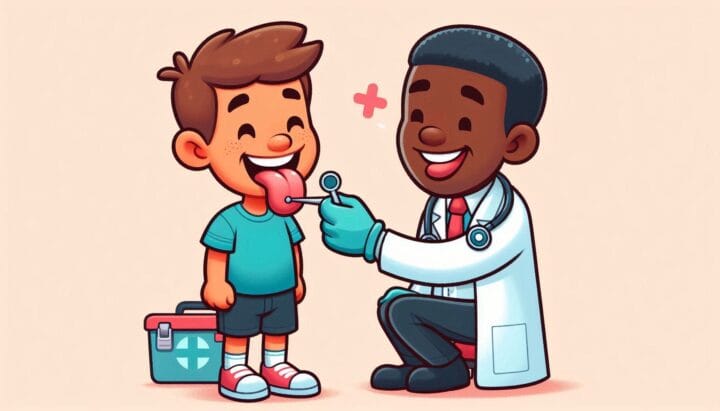Understanding Tongue Tie: Causes, Symptoms, and Treatment Options
Table of Contents

Introduction:
Tongue tie, also known as ankyloglossia, is a condition present at birth that restricts the tongue’s range of motion. This article provides a comprehensive overview of tongue tie, including its causes, symptoms, and treatment options. Whether you’re a new parent concerned about your infant’s feeding habits or an adult experiencing speech difficulties, this guide will help you understand tongue tie and its implications.
What is Tongue Tie?
Tongue tie occurs when an unusually short, thick, or tight band of tissue (lingual frenulum) tethers the bottom of the tongue’s tip to the floor of the mouth. This condition can affect a person’s ability to speak, eat, and perform other oral functions.
Causes of Tongue Tie
The exact cause of tongue tie is not fully understood. However, research suggests that it may be related to genetic factors. During fetal development, the tongue typically separates from the floor of the mouth. In cases of tongue tie, this separation process is incomplete.
Symptoms of Tongue Tie
In Infants
- Difficulty latching during breastfeeding
- Poor weight gain
- Clicking sounds while feeding
- Inability to extend the tongue past the lower lip
In Older Children and Adults
- Speech difficulties, especially with certain sounds
- Problems with oral hygiene
- Difficulty licking ice cream or playing wind instruments
- Social or self-esteem issues related to limited tongue movement
Diagnosing Tongue Tie
Healthcare providers typically diagnose tongue tie through a physical examination. They assess the appearance and movement of the tongue, as well as its impact on oral functions.
Treatment Options for Tongue Tie
Conservative Management
In some cases, tongue tie may not require treatment. The condition can improve as the child grows and the frenulum naturally stretches.
Frenotomy
This is a simple surgical procedure where the frenulum is cut to release the tongue. It’s often performed on infants and can be done in a doctor’s office.
Frenuloplasty
For more severe cases or in older patients, a more extensive surgery called frenuloplasty may be necessary. This procedure involves cutting the frenulum and using stitches to close the wound.
Impact of Tongue Tie on Breastfeeding
Tongue tie can significantly affect an infant’s ability to breastfeed effectively. It may cause:
- Poor latch
- Inefficient milk transfer
- Nipple pain for the mother
- Frustration for both mother and baby
Long-term Effects of Untreated Tongue Tie
If left untreated, tongue tie can lead to:
- Speech difficulties
- Dental problems
- Challenges with certain social activities (like kissing)
- Self-esteem issues
When to Seek Medical Advice
Consult a healthcare provider if you notice:
- Feeding difficulties in infants
- Speech problems in children
- Persistent oral discomfort or limited tongue movement in adults
The Controversy Surrounding Tongue Tie
There is ongoing debate in the medical community about the prevalence of tongue tie and the necessity of treatment in all cases. Some experts argue that the condition is overdiagnosed and overtreated.
Conclusion
Tongue tie is a common condition that can affect individuals from infancy through adulthood. While it can cause significant challenges, especially with feeding and speech, effective treatments are available. If you suspect that you or your child may have tongue tie, consult with a healthcare provider for a proper diagnosis and treatment plan. Remember, early intervention can often lead to better outcomes and improved quality of life.
FAQs
- Q: Can tongue tie resolve on its own?
A: In some cases, especially mild ones, tongue tie may improve as the child grows and the frenulum naturally stretches. However, more severe cases often require treatment. - Q: Is tongue tie surgery painful?
A: The procedure is generally quick and causes minimal discomfort. In infants, it can often be done without anesthesia. Older children and adults may require local anesthesia. - Q: How long does it take to recover from tongue tie surgery?
A: Recovery is typically quick, especially for infants. Most individuals can resume normal activities immediately after the procedure. Some mild discomfort may persist for a few days. - Q: Can tongue tie affect speech in adults?
A: Yes, untreated tongue tie can lead to speech difficulties in adults, particularly with certain sounds that require full tongue movement. - Q: Are there any risks associated with tongue tie surgery?
A: While generally safe, potential risks include bleeding, infection, and damage to surrounding tissues. However, these complications are rare when the procedure is performed by a qualified healthcare provider.
References:
- American Academy of Pediatrics. (2023). Ankyloglossia (Tongue-Tie). Retrieved from https://www.healthychildren.org/English/health-issues/conditions/head-neck-nervous-system/Pages/Ankyloglossia-Tongue-Tie.aspx
- Mayo Clinic. (2024). Tongue-tie (ankyloglossia). Retrieved from https://www.mayoclinic.org/diseases-conditions/tongue-tie/symptoms-causes/syc-20378452
- National Health Service. (2023). Tongue-tie. Retrieved from https://www.nhs.uk/conditions/tongue-tie/
- O’Shea, J. E., Foster, J. P., O’Donnell, C. P., Breathnach, D., Jacobs, S. E., Todd, D. A., & Davis, P. G. (2017). Frenotomy for tongue-tie in newborn infants. Cochrane Database of Systematic Reviews, 3(3), CD011065.
- Suter, V. G., & Bornstein, M. M. (2009). Ankyloglossia: facts and myths in diagnosis and treatment. Journal of Periodontology, 80(8), 1204-1219.
Citations:
[1] https://kidshealth.org/en/parents/tongue-tie.html
[2] https://www.mayoclinichealthsystem.org/hometown-health/speaking-of-health/the-truth-about-tongue-tie
[3] https://www.childrens.com/health-wellness/how-to-tell-if-your-baby-is-tongue-tied
[4] https://www.mayoclinic.org/diseases-conditions/tongue-tie/symptoms-causes/syc-20378452
[5] https://www.webmd.com/children/tongue-tie-babies
[6] https://my.clevelandclinic.org/health/diseases/17931-tongue-tie-ankyloglossia
[7] https://www.betterhealth.vic.gov.au/health/conditionsandtreatments/tongue-tie
[8] https://www.nhs.uk/conditions/tongue-tie/













Post Comment